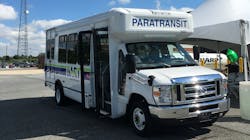Across America, transit agencies are making the move to clean-burning, emissions-reducing shuttles buses fueled by propane autogas. More than 700 vehicles equipped with Roush CleanTech propane autogas fuel systems operate in the transit industry, with the projected number to exceed 850 vehicles by the end of 2016. More than 30 transit agencies across the nation operate these vehicles.
Why are so many transit agencies making the move to this alternative fuel? Like most organizations investing in new vehicles, transit agencies seek a swift return on investment and a seamless fueling experience. Propane-fueled vehicles can meet those goals.
Return on Investment
The Delaware Transit Corp. (DTC) recently expanded its fleet of paratransit shuttles fueled by propane autogas after conducting a pilot program.
“Our first five propane-fueled buses collectively traveled 450,000 miles with no fuel system-related failures, and saved $15,000 in fuel costs alone,” said John T. Sisson, chief executive officer of Delaware Transit Corp. “That, combined with the reduction in greenhouse gas emissions, made it an easy decision to expand the propane program with 130 buses by 2018.”
In Ohio, the Greater Cleveland Regional Transit Authority (RTA) recouped its initial investment of 20 propane autogas shuttles within a year and now saves $21,000 in total operating costs.
Michigan’s Flint Mass Transportation Authority (MTA) expects to save $70,000 per vehicle during their normal lifecycle of 10 years and 350,000 miles, for a total savings of more than $5 million. They’ve experienced savings in time, too — due to less maintenance required.
On average, propane autogas costs 40 percent less than gasoline and 50 percent less than diesel. And, maintenance expenses are reduced due to the cleaner-burning properties of the fuel.
Propane Infrastructure
Many fleet managers elect to install low-cost on-site refueling infrastructure, eliminating trips to off-site stations. Propane autogas fueling infrastructure costs less than any other transportation energy source — conventional or alternative.
Propane suppliers work directly with organizations to figure out the best onsite fueling solution for each situation. For example, DTC partnered with Sharp Energy for its propane infrastructure and fuel.
“As we expand our autogas fueling station infrastructure, we can provide greater access to this low-cost, domestically produced fuel,” said Bob Zola, president of Sharp Energy, which also provides maintenance support for DTC’s paratransit buses.
For some agencies, fueling at a nearby public station is a viable option. There are more than 1,500 public propane autogas fueling stations in the United States, with stations in every state, in addition to thousands more private stations.
Funding and Rebates
Transit agencies can take advantage of a number of ways to offset the cost of a propane autogas-powered vehicle.
The Roush CleanTech Ford E-450 cutaway chassis has completed the Federal Transit Administration’s (FTA) New Model Bus Testing Program (Altoona Testing), which allows a transit fleet operator to access federal funds that cover 85 percent of entire alternative fuel vehicle cost with a 15 percent local match.
Blue Bird’s Commercial Vision Propane is also Altoona-test rated — for 350,000 miles or 10 years. Flint MTA purchased 16 of these propane-fueled buses with FTA funding.
“In addition to providing cleaner operations, our propane buses cost only one-third of the price of heavy-duty transit buses, so they are an extremely cost-effective way to augment our transit bus fleet,” Ed Benning, Flint MTA’s general manager and CEO, said.
Earlier this year, alternative fuel infrastructure and excise tax credits were extended through December 2016. The excise tax credits are in addition to the historically lower prices of propane autogas compared with diesel and gasoline.
The current alternative fuel excise tax credit consists of a 36-cents-per-gallon for 2016. Many of our customers take advantage of these credits. Flint MTA pays a locked-in rate of 75 cents for propane autogas. With 2016 credits, the price per gallon will be 39 cents per gallon.
An agency installing an onsite fuel station can take advantage of a fueling infrastructure credit for up to 30 percent of installation costs, not to exceed $30,000. Propane autogas fueling infrastructure costs less than any other transportation energy source — conventional or alternative.
Other funding opportunities can be found on the Alternative Fuels Data Center website at afdc.energy.gov/laws.
Todd Mouw is the vice president of Sales & Marketing with Roush CleanTech.

Todd Mouw | Executive Vice President of Sales and Marketing
Todd Mouw is executive vice president of sales and marketing for ROUSH CleanTech, an industry leader of alternative fuel vehicle technology. Mouw has served as president of the NTEA Green Truck Association.


